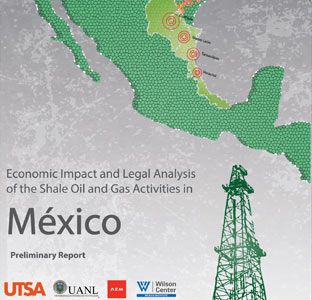The University of Texas at San Antonio’s Institute for Economic Development, the Universidad Autónoma de Nuevo León, the Asociación de Empresarios Mexicanos, and the Woodrow Wilson Center are set to release a preliminary report to gauge the growth and the effects that the oil and natural gas industry will have for residents and decision makers in Mexico.
The report contains a general overview on the Energy Reform, an economic background on oil and natural gas (especially trade between US and México) a state level profile, infrastructure and educational certificates specific to oil and natural gas education. The core study area concentrates on the economic impact on the following Mexican states: Coahuila, Nuevo León, Tamaulipas and Veracruz.
“Opportunities for unconventional or shale oil and gas productions in Mexico are in the earliest stages of development. Due to its close proximity to major shale field development in South and West Texas, Mexico is particularly well positioned to take advantage of unconventional extraction techniques,” said Thomas Tunstall, research director at the UTSA Institute for Economic Development.
After being elected in 2012, Mexican President Enrique Peña Nieto worked with other ruling parties to create a “Pact for Mexico” which included 11 important reforms, one of which was energy. The initial proposed reforms focused on removing hydrocarbons from the sectors controlled directly by the government. Thus opening up oil and gas fields through exploration and production contracts with the Mexican government, as well the granting of permits for the development of a robust and well-integrated hydrocarbons infrastructure.
México sits atop an estimated 545 trillion cubic feet (Tcf) of shale natural gas reserves, and additional trillions of cubic feet of conventional reserves. The bulk of México’s shale prospects appear to lie in the north and northeastern sections of the country, where infrastructure is often largely undeveloped. This means that in order to tap the country’s bounty of shale oil and gas, infrastructure such as roads, housing, rail, pipeline and many others will have to be built out first. The ability to develop a suitably skilled workforce will be key to long-term success. Security issues must also be addressed.
The second part of the report introduces a preliminary Business Roadmap, A Guide for the Operator, which briefly describes the necessary steps a prospective operator in the upstream activity in Mexico will have to comply with in order to expand or initiate operations in Mexico.
——————————
Download the full preliminary report at : http://bit.ly/Mexico-OilGas-Prelim
Descargue el informe preliminar completo en : http://bit.ly/Mexico-OilGas-Prelim-ESP
——————————




